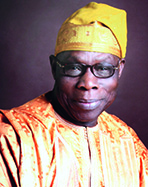European Russophobia and Europe’s Rejection of Peace: A Two-Century Failure
Europe has repeatedly rejected peace with Russia at moments when a negotiated settlement was available, and those rejections have proven profoundly self-defeating. Read more
 Olusegun Obasanjo
Olusegun Obasanjo
Mining and oil is not a sunset industry in Africa. The sector holds great promise — Africa has a big comparative advantage in its store of mineral wealth and human capital. But unlocking this needs policies that encourage long-term, generational investment, not shortsighted resource grabs.
Identifying the "right" policies was the wellspring of a dialogue on the banks of the Zambezi River hosted by The Brenthurst Foundation, which I chair. The participants, mainly mining experts and investors, cohered around legislative certainty, the provision of reliable services, a stable and attractive tax regime, a predictable and transparent legal system, policy cohesion, a reliance on administrative regulation rather than political discretion, and honest and competent officials.
To establish such a framework, a new narrative of the value of the industry to Africa is necessary. This narrative has been defined by conspiracy and mistrust. We need to move towards a shared dialogue based on mutual dependency and endeavour, underpinned by a clear belief that government needs investors and vice versa.
The main outcome of our meeting is the Zambezi Protocol, which offers a path for government, business and other partners to chart a fresh, positive future for mining in Africa. The urgency relates to the state of the mining sector in Africa: it’s in crisis. A lack of trust between mining companies, governments and the nations they lead has taken hold. Failure to tackle this will have adverse implications for economic growth and employment prospects when the continent’s needs are increasing rapidly.
Most African governments recognise that much more needs to be done to diversify our economies, but we mustn’t lose sight of how dependent most of us are on the extractives sector. It comprised 28% of the continent’s combined gross domestic product in 2012, 77% of total exports and 42% of all government revenues. Studies by the International Council on Mining and Metals show that for every $1 generated by mining, at least $3 more is generated elsewhere in the local economy, and that for every direct mining employee, as many as 15 more jobs are created elsewhere in that economy.
The end of the commodity super-cycle has negatively affected most of Africa, which had become accustomed to sustained economic growth rates of above 5%.
Economic growth across sub-Saharan Africa, especially in countries reliant on commodities for export and government revenue, is predicted to drop to 3.3% this year. Things are set to become a lot more challenging.
The article's full-text is available here.